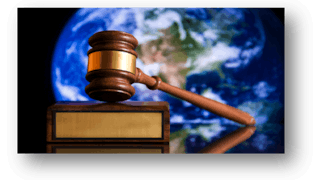Le droit international en action explique les fonctions de chaque cour et tribunal international présent à La Haye et examine la manière dont ces institutions traitent les problèmes contemporains. Sur la base d'une sélection d'affaires et d'entretiens avec des juges et des avocats, vous explorerez le rôle de ces cours et tribunaux et leur potentiel à contribuer à la justice mondiale.


Le droit international en action : Guide des cours et tribunaux internationaux de La Haye



Instructeurs : Larissa van den Herik
61 670 déjà inscrits
(1,218 avis)
Compétences que vous acquerrez
- Catégorie : Droit civil
- Catégorie : Médiation
- Catégorie : Adjudication
- Catégorie : Sciences politiques
- Catégorie : Relations internationales
- Catégorie : Systèmes judiciaires
- Catégorie : Diplomatie
- Catégorie : Audiences juridiques
- Catégorie : L'arbitrage
- Catégorie : Procédures judiciaires
- Catégorie : Jurisprudence
- Catégorie : Études de cas
- Catégorie : Recherche juridique
Détails à connaître

Ajouter à votre profil LinkedIn
Découvrez comment les employés des entreprises prestigieuses maîtrisent des compétences recherchées

Il y a 5 modules dans ce cours
Bienvenue dans cette première semaine où nous allons entrer avec vous dans le monde du judiciaire international. Nous discuterons de l'évolution du règlement des différends internationaux dans notre ordre juridique international. La question principale est la suivante : pourquoi a-t-on commencé à penser à créer des tribunaux internationaux ? Nous vous présenterons également la communauté des juridictions internationales présentes aujourd'hui à La Haye.
Inclus
8 vidéos3 lectures1 devoir1 sujet de discussion1 plugin
Cette semaine, nous allons étudier le principal organe judiciaire des Nations unies, la Cour internationale de justice. Cette Cour a une double fonction : celle d'une institution qui règle les différends entre les États et celle d'un organe de conseil au sein du système des Nations unies. Nous étudierons les limites auxquelles la Cour est confrontée dans l'exercice de ces fonctions ainsi que son potentiel en tant qu'institution, en particulier dans le contexte des litiges relatifs à la protection de l'environnement. À partir de cette semaine, vous pourrez également commencer à travailler sur le travail en équipe. Vous trouverez ci-dessous toutes les informations relatives à ce travail. Nous sommes impatients de lire votre vision de l'avenir des cours et tribunaux internationaux à La Haye !
Inclus
5 vidéos2 lectures1 devoir1 évaluation par les pairs
Cette semaine, nous allons explorer le monde de l'arbitrage international. Plus précisément, nous nous intéresserons à la Cour permanente d'arbitrage, à l'arbitrage interétatique et à l'arbitrage entre investisseurs et États. A travers nos vidéos, vous découvrirez l'histoire et les caractéristiques de l'arbitrage et vous comprendrez comment son fonctionnement est influencé par les dynamiques à l'œuvre au sein des sociétés internationales et nationales. Vous réaliserez également l'importance des intérêts publics dans les litiges réglés par l'arbitrage et vous apprendrez comment ils sont pris en compte dans l'arbitrage international.
Inclus
5 vidéos2 lectures1 devoir
Cette semaine, nous examinons un type relativement nouveau de tribunaux internationaux, à savoir les tribunaux pénaux internationaux, en mettant l'accent sur la CPI. Nous discuterons des affaires et des débats en cours, y compris des questions sensibles telles que la poursuite de chefs d'État en exercice. Nous nous demanderons également si la communauté internationale a besoin d'un nouveau tribunal spécialisé dans le terrorisme international.
Inclus
5 vidéos3 lectures1 devoir
Cette semaine, nous nous concentrerons directement sur les trois thèmes du cours qui ont structuré nos discussions dans les modules précédents : le droit et la politique, le consentement de l'Etat et les valeurs globales. Pour chacun de ces thèmes, les vidéos de ce module vous donneront l'occasion de synthétiser les connaissances que vous avez acquises tout au long du cours et de comparer les différentes cours et tribunaux qui ont été analysés à travers les lentilles des thèmes du cours. Les vidéos de ce module vous proposeront également des observations et des réflexions finales qui vous inciteront à poursuivre votre réflexion sur ces trois thèmes et sur les juridictions internationales de La Haye de manière plus générale. Cette semaine, vous passerez également l'examen final de ce cours ; bonne chance !
Inclus
3 vidéos1 devoir
Instructeurs


Offert par
En savoir plus sur Droit
 Statut : Prévisualisation
Statut : Prévisualisation Statut : Prévisualisation
Statut : PrévisualisationUniversiteit Leiden
 Statut : Prévisualisation
Statut : PrévisualisationCase Western Reserve University
 Statut : Prévisualisation
Statut : PrévisualisationUniversiteit Leiden
Pour quelles raisons les étudiants sur Coursera nous choisissent-ils pour leur carrière ?




Avis des étudiants
1 218 avis
- 5 stars
82,37 %
- 4 stars
14,75 %
- 3 stars
2,04 %
- 2 stars
0,40 %
- 1 star
0,40 %
Affichage de 3 sur 1218
Révisé le 26 août 2019
Really good videos. Very informative and complete. Great study material. Wish the requirements were a bit more strict to pass.
Révisé le 3 janv. 2017
The course was extremely informative with a holistic perspective on the functioning of various international courts as well as special courts addressing international law issues.
Révisé le 17 févr. 2016
I think this course will be an added value to any one has interest to understand the IL principles with more focus in the Hague.

Ouvrez de nouvelles portes avec Coursera Plus
Accès illimité à 10,000+ cours de niveau international, projets pratiques et programmes de certification prêts à l'emploi - tous inclus dans votre abonnement.
Faites progresser votre carrière avec un diplôme en ligne
Obtenez un diplôme auprès d’universités de renommée mondiale - 100 % en ligne
Rejoignez plus de 3 400 entreprises mondiales qui ont choisi Coursera pour les affaires
Améliorez les compétences de vos employés pour exceller dans l’économie numérique
Foire Aux Questions
Pour accéder aux supports de cours, aux devoirs et pour obtenir un certificat, vous devez acheter l'expérience de certificat lorsque vous vous inscrivez à un cours. Vous pouvez essayer un essai gratuit ou demander une aide financière. Le cours peut proposer l'option "Cours complet, pas de certificat". Cette option vous permet de consulter tous les supports de cours, de soumettre les évaluations requises et d'obtenir une note finale. Cela signifie également que vous ne pourrez pas acheter un certificat d'expérience.
Lorsque vous achetez un certificat, vous avez accès à tous les supports de cours, y compris les devoirs notés. Une fois le cours terminé, votre certificat électronique sera ajouté à votre page de réalisations - à partir de là, vous pouvez imprimer votre certificat ou l'ajouter à votre profil LinkedIn.
Oui, pour certains programmes de formation, vous pouvez demander une aide financière ou une bourse si vous n'avez pas les moyens de payer les frais d'inscription. Si une aide financière ou une bourse est disponible pour votre programme de formation, vous trouverez un lien de demande sur la page de description.
Plus de questions
Aide financière disponible,
¹ Certains travaux de ce cours sont notés par l'IA. Pour ces travaux, vos Données internes seront utilisées conformément à Notification de confidentialité de Coursera.

